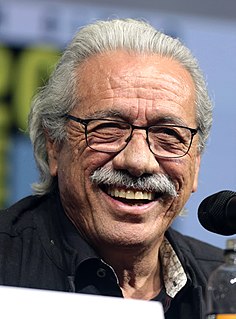A Quote by Edward T. Hall
One of the most effective ways to learn about oneself is by taking seriously the cultures of others. It forces you to pay attention to those details of life which differentiate them from you.
Related Quotes
From the simplest lyric to the most complex novel and densest drama, literature is asking us to pay attention. Pay attention to the frog. Pay attention to the west wind. Pay attention to the boy on the raft, the lady in the tower, the old man on the train. In sum, pay attention to the world and all that dwells therein and thereby learn at last to pay attention to yourself and all that dwells therein.
I'm a pluralist about perspectives on literature. There seem to me to be all sorts of illuminating ways of responding to major literary works, some of them paying considerable attention to context, others applying various theoretical ideas, yet others focusing on details of language, or linking the work to the author's life, or connecting it with other works.
Men and women drink essentially because they like the effect produced by alcohol. The sensation is so elusive that, while they admit it is injurious, they cannot after a time differentiate the true from the false. To them, their alcoholic life seems the only normal one. They are restless, irritable, and discontented, unless they can again experience the sense of ease and comfort which comes at once by taking a few drinks-drinks which they see others taking with impunity.
Everybody has their own way of remembering and every culture has their traditions. When you compare the similarities and differences to other cultures, you start to learn about them and appreciate them. Whether it's the Japanese or the Africans, they all have ways of conjuring spirits and the support of those who have gone before them.
Mindfulness is about finding ways to slow down and pay attention to the present moment-which improves performance and reduces stress. It’s about having the time and space to attend to what’s right in front of us, even though many other forces are trying to keep us stuck in the past or inviting us to fantasize or worry about the future. It’s about a natural quality each of us possesses, and which we can further develop in just a few minutes a day.
You invite judgment into your life every time you judge others. To avoid this invitation to negativity, it's best to stop focusing on others' darkness. Instead, pay attention to their strengths. Today, be a horse with blinders. Look at only the good. As you develop this power, you will attract positive forces into your life.
The theory of government I was taught says that government provides benefits, primarily security, to the entire population. In return we pay taxes. But lately the government has been a distributor of special privileges, taking money from some and giving it to others. America is now about evenly split between those who pay income taxes and those who consume them.
The ability to help others gain insights seems very important to me, and I think one of the most effective, but most difficult, ways is to listen sympathetically when people seem to be saying stupid things or thinking in confused ways. Rather than write them off, we can try to diagnose what is wrong with their thinking - what flawed belief they might be holding. And then search for ways that enables them to discover the flawed belief for themselves.
Effective altruism is a philosophy and social movement which tries to work out the most effective ways to improve the world. Effective altruists - conform to old-school utilitarian principles - consider all causes and actions, and then act in the way that they believe brings about the greatest positive impact.
Unlike most of life, what you do really matters. Your actions have real consequences. You have to pay attention and focus, and that's very satisfying. It forces you to pay great attention and you lose yourself in the task at hand. Without the risk, that wouldn't happen, so the risk is an essential part of climbing, and that's hard for some people to grasp. You can't justify the risk when things go wrong and people die. The greater the risk, the greater the reward in most aspects of life, and in climbing that's certainly true, too. It's very physical, you use your mind and your body.
Eventually we realize that not knowing what to do is just as real and just as useful as knowing what to do. Not knowing stops us from taking false directions. Not knowing what to do, we start to pay real attention. Just as people lost in the wilderness, on a cliff face or in a blizzard pay attention with a kind of acuity that they would not have if they thought they knew where they were. Why? Because for those who are really lost, their life depends on paying real attention. If you think you know where you are, you stop looking.
The Fascist accepts life and loves it, knowing nothing of and despising suicide; he rather conceives of life as duty and struggle and conquest, life which should be high and full, lived for oneself, but not above all for others those who are at hand and those who are far distant, contemporaries, and those who will come after.





































